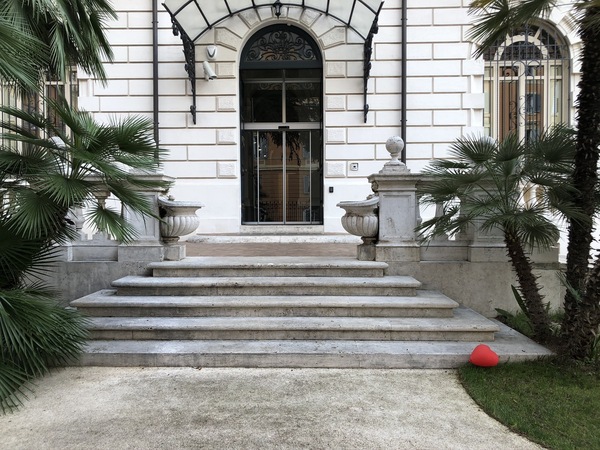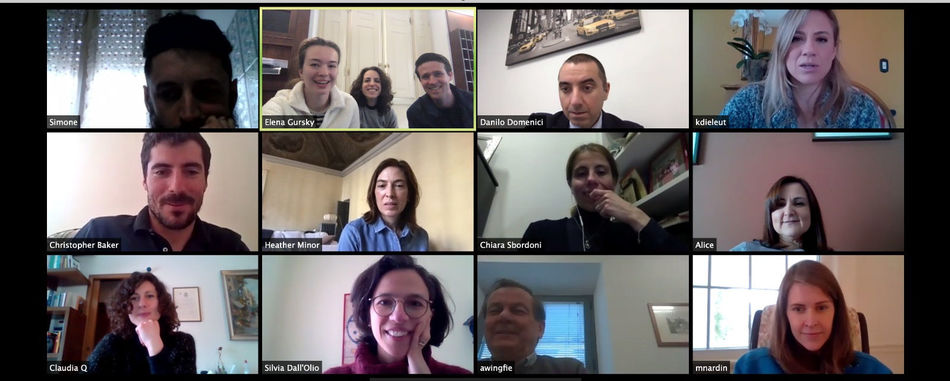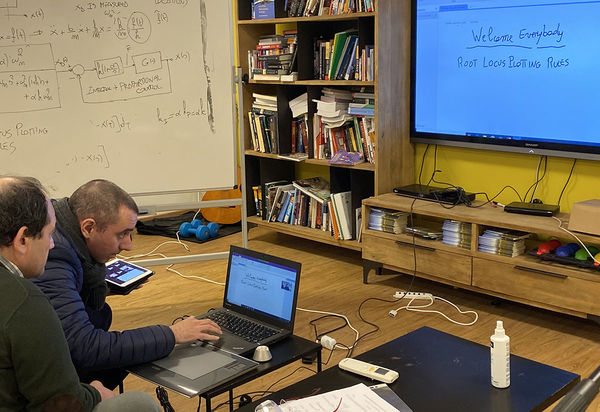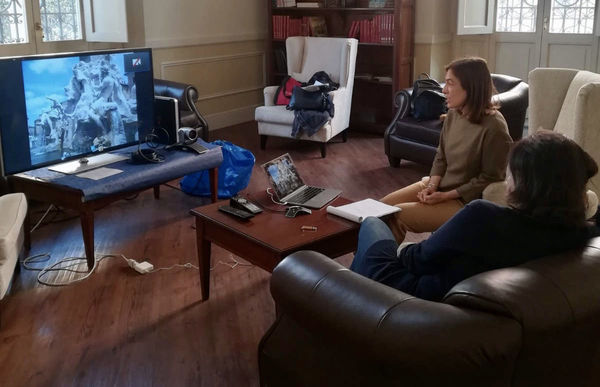

Three weeks before Italy went on lockdown to combat the spread of COVID-19, the Rome Global Gateway (RGG) was preemptively taking drastic measures to protect its study abroad students, faculty, staff, and surrounding community. The RGG was the first study abroad program at the University of Notre Dame to witness and respond to what has since evolved into a global pandemic.
On Friday, February 21, the RGG learned of COVID-19 cases in the north of Italy and began collaborating with the Emergency Operation Center (EOC) on campus on how to protect and care for its community in the case of a future spread. One week later, Silvia Dall’Olio, executive director of the RGG, began participating in twice-a-day EOC meetings. The meetings explored and discussed various scenarios pertaining to Coronavirus, until the final decision was made for students to return home.
“The EOC offered crucial guidance and timely answers during a time when we needed it most,” says Dall’Olio. “Perspectives were heard from across the team, allowing for a very lateral decision process. I felt that the RGG’s voice and local experience were valued at every step.”
Staff organized an informational meeting on Tuesday, February 25 with Dr. Andrea Guerriero, a general practitioner who regularly sees RGG patients. During the meeting, Guerriero answered questions from the RGG community. Two days later, staff attended a mandatory meeting and shared updates regarding the current situation, as well as possible next steps, including the possibility of repatriation if the situation progressed.
The response
Late in the evening on Friday, February 28th, the decision from the Centers for Disease Control and Prevention (CDC) to raise the advisory against non-essential travel to Italy to Level 3 led Notre Dame officials to make the difficult but necessary decision to end all programming at the RGG for the remainder of the semester. The first priority was to ensure a quick and safe return to the United States for all students. Students were immediately notified of the decision through Everbridge, a comprehensive program that allows the RGG to reach out to students in real time through various means including email, text, and phone call.
On Saturday, February 29, staff called a morning meeting with students to prepare for departure and share information on repatriation and semester continuity. After a challenging day of packing and preparing to leave the country, the RGG community came together for a farewell dinner on students’ last night in the eternal city.
Liquid error: wrong number of arguments (given 3, expected 1..2)
“On that night, they were of course overwhelmed and quite sad, but also were very thankful and shared kind words with us,” reflects Antonella Piccinin, Villa rector.
With the support of Notre Dame campus staff and Anthony Travel, all students were booked on flights home. All students safely returned to the United States by Monday, March 2. Following students’ departure, the Villa staff worked to make sure food didn’t go to waste, donating all unopened items to Piccole Sorelle dell’Agnello.
“There were many things that happened during that week that were key to what was an extremely successful operation of the repatriation of students,” says Dall’Olio.
A proactive approach
To better prepare for possible emergencies, the RGG previously participated in several crisis exercises where each staff member took a specific role and worked through various scenarios.
The combination of preparedness through training and several specific team elements allowed RGG staff and faculty to react successfully to the COVID-19 emergency.
“Looking back, there are two specific strengths that allowed for an efficient and effective response: communication and cohesiveness," synthesizes Dall’Olio.
Dall’Olio says constant communication with the study abroad students was one of the Gateway’s top priorities. The team hosted three meetings with students during the week leading up to their departure, allowing staff to guide students through the critical steps needed to get them home safely. These meetings not only provided consistent updates on the current situation and possible future outcomes, but they also allowed the RGG to address student concerns, making sure that, as the situation changed, nothing came as a surprise.
“We were able to formulate questions and get answers both amongst ourselves and with campus in a very effective way,” reflects Dall’Olio.
She also points out the agility and cohesiveness of the RGG faculty and staff, as they were able to immediately change pace and adjust to the most urgent activities.
“It became very clear that staff were able to be engaged with a very high level of focus and time almost overnight. This, we cannot take for granted,” she says.
Academic continuity
When reflecting on the RGG’s quick response to the Coronavirus outbreak, Academic Director Heather Hyde Minor also points out the natural inclination of staff to work together on everyday tasks and projects. When the emergency arose, staff members were prepared to come together and ensure accuracy and efficiency in all tasks as the situation continuously changed.

Once students had returned to the United States, faculty and staff in Rome immediately switched their focus to academic continuity and began creating plans for remote learning. Within two weeks, all courses that were being taught at the RGG were offered through remote learning in both synchronous and asynchronous formats.
The RGG student experience goes beyond the Gateway’s four walls through internships with local partners and courses with partner universities. Students have continued to study with partner universities online and the majority of Rome International Scholars have been able to continue their internships with local institutions virtually. As the entire Roman community works through the challenges of this period, the RGG’s already strong relationships with local institutions and organizations have continued to grow and evolve.
With the support of IT Specialist Danilo Domenici, faculty members adapted their courses to creatively deliver content and meet the unique needs of their students. Many classes, including “All Roads Lead to Rome,” have decided to use a mix of strategies to allow students flexibility in completing work online while still maintaining a sense of community within the class.

Hyde Minor and Professor Daria Borghese, who both teach separate sections of “All Roads Lead to Rome,” created a unique solution and joined forces to record their asynchronous classes together. Both have enjoyed the experience of virtual team teaching and hope to apply this concept even further in future semesters.
“I can see ways that we might be able to continue to use this technology to connect RGG classes with those back on campus or hosting guest lecturers from campus to our classes via Zoom,” reflects Hyde Minor.
Many RGG faculty members credit students’ adaptability and positive attitudes to the success in transferring courses to remote learning.
“It’s been inspiring to see how students responded to such an abrupt and radical change,” says Chiara Sbordoni, professor of Italian. “Their sense of responsibility and their proactive attitudes are very appreciated.”
Business continuity
The ambience at the RGG dramatically changed on Monday, March 2 after all students left. It was evident that faculty and staff missed the vibrant community of learners. In this moment, RGG faculty and staff came together to review the situation, make adjustments, and begin creatively thinking about how the semester could continue remotely. Following a decree from the Italian government, the RGG remained open until March 13. Since its closure, all faculty and staff have been working remotely and using Zoom and other technologies to collaborate and plan for the future.
During this time, staff have been creating guides and documents to increase efficiency, standardize procedures, and further develop elements of the strategic plan including student exchanges and alumni network development. Current projects include developing a business continuity plan, updating our communications strategy, creating new resources for faculty, and increasing the usability of our website.
Future outlook

Though challenging, the unity of students, faculty, staff, and community partners has been inspiring and a true tribute to the strength of the RGG. As Fr. Jenkins said during his address in late March: “At Notre Dame, we become stronger and more united when we fight through adversity.” The RGG faculty and staff are developing ways of continuing research, teaching, and events with local partners both in-person and through virtual means.
Though the current situation is unpredictable, the RGG and its personnel are preparing for a future filled with new possibilities and the increased and continuous support of the greater Italian community.
Originally published by at rome.nd.edu on April 03, 2020.